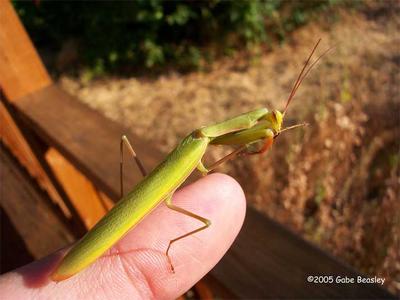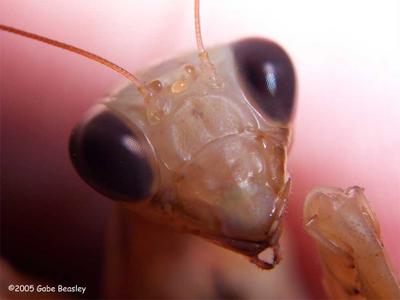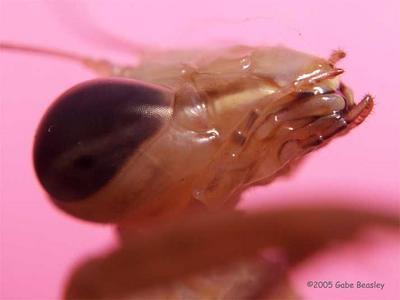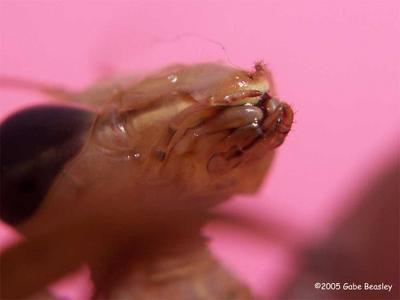
This guy flew into my lights not long ago. I kept a couple of them inside
overnight because of the local cats. I took this in the morning when I realized
them. BEWARE keeping two praying mantis together in one cage will probably
result in a deadly fight. I knew this allready from when I was a kid in Hawaii.
Just as I learned they will take food but NEVER feed them human foods as
things like potato chips are deadly toxic to them. If you ever catch them to
hold them even if they seem to get along at first ALWAYS–keep them
separated.

This is the closest shot I’ve ever gotten of a praying mantis head without croping.
You can see the three possibly directional eyes between the two big ones.
I’m not certain what these simple eyes are for–but they can be seen
in bees and many other insects. I theorize that they may be an instant
way for the Insects to orient themselves while flying. Basically
often when insects are flying they cannot see what is going on past
them with there complex compound eyes. The world becomes a
blur. In order for flight orientation it makes sense to have sensors
which can orient the position of the sun (the sky) and areas that are
light and dark. This is only my theory–I wish I had my detailed anatomy
books that I used too. But it would make sense to have sensory
eyes like this which don’t focus but simply sense the present of light
and dark without overwhelming the senses as it surely must get
when flying insects are dodging plants and even each other often.
Basically, they may be a way to find the exact position of the sun.
Then again for all I know they could amount to very little.
As I note–my THEORIES are clearly marked from what I know to
be fact. Above is just a theory I will have to study up on in the
future. I will update this book when I find out–this has been
something. I”ve wanted to know for a long time. What are the
other three eyes for? Most insects clearly don’t just have two when
you look at them close up.

It’s not showing jaws now as it is not feeding or irritated and upset. Just look at the
complex mouthparts. Incredible--that would be like having 10 tongs or
something! The larger ones in Hawaii and other tropical places often get angry
and in this situation may rear up and show there mandibles–even bite. I’ve actually
had one begin to attempt to seemingly eat me alive as I held on to it for too long!

Another shot of the underside showing mantis mouth parts.
THE STARS AT CAMP
 I took this picture on the California, Nevada border. The exposure time was
I took this picture on the California, Nevada border. The exposure time wasabout 60 seconds. My CCD shutter was open for one whole minute at 400ISO.
Opening up the CCD longer reduced my view of the trees, I did a number of
pictures like this- some showing the big dipper. The stars were amazeing.
Be sure to click on this picture to see it as large as it gets on line.
That's a great story. Waiting for more. »
ReplyDeleteThe simple eyes on the top of their heads are used to detect light.
ReplyDeleteI find it fascinating how insects like praying mantises have such complex mouthparts and sensory abilities.
ReplyDelete